Podcast
Questions and Answers
What principle characterizes the political life in Athens as described by Pericles?
What principle characterizes the political life in Athens as described by Pericles?
- Leadership relies on military strength.
- Power is held by a minority elite.
- Citizens are equal before the law. (correct)
- Political decisions are made by a council of rulers.
Which aspect of Greek civilization is highlighted as contributing to Western civilization's intellectual foundations?
Which aspect of Greek civilization is highlighted as contributing to Western civilization's intellectual foundations?
- Artistic expression through tragedy and comedy.
- Mysticism and religious practices.
- Rational thought and analytical inquiry. (correct)
- Monarchical systems of governance.
What geographical feature most significantly isolated Greek communities from one another?
What geographical feature most significantly isolated Greek communities from one another?
- Coastal harbors
- Plains and valleys
- Mountain ranges (correct)
- River systems
In what context did Pericles deliver his funeral oration?
In what context did Pericles deliver his funeral oration?
Which region was primarily known for being the location of Sparta?
Which region was primarily known for being the location of Sparta?
What distinguishes the ideals of democracy in Athens from those of other ancient societies, according to the passage?
What distinguishes the ideals of democracy in Athens from those of other ancient societies, according to the passage?
What was the main consequence of the fratricidal warfare among Greek states?
What was the main consequence of the fratricidal warfare among Greek states?
What significant institution emerged in ancient Greece as characteristic of its life?
What significant institution emerged in ancient Greece as characteristic of its life?
Which Greek region contained the largest plains and was a major producer of grain and horses?
Which Greek region contained the largest plains and was a major producer of grain and horses?
What significant action did Alexander, the son of Philip II, take that impacted Greek culture?
What significant action did Alexander, the son of Philip II, take that impacted Greek culture?
Flashcards are hidden until you start studying
Study Notes
Warring States Period and the Peloponnesian War
- The Warring States Period in China coincided with a civil war in Greece, specifically the Peloponnesian War starting in 431 B.C.E.
- Key city-states involved were Athens and Sparta, each vying for control over the Greek world.
Pericles and Athenian Democracy
- Pericles delivered a public funeral oration honoring those who had died in battle, reflecting on Athenian values.
- He emphasized the democratic system of Athens, highlighting that power rested in the hands of the entire populace, not just a minority.
- Pericles articulated the importance of both individual rights and civic responsibility, contrasting Athenian ideals with those of autocratic societies.
Greek Philosophical Inquiry
- Greeks engaged deeply with fundamental questions about existence, purpose, community, and truth.
- They developed a system of logical and analytical thought, laying the groundwork for Western civilization's understanding.
The Emergence of the Polis
- Greek civilization began around 1900 B.C.E., resulting in the rise of the polis, or city-state, by the eighth century B.C.E.
- The classical era of the fifth century B.C.E. marked the zenith of Greek culture, yet internal conflicts weakened their independent city-states.
Macedonian Conquest and Its Impact
- The internal warfare among Greek city-states made them vulnerable to external threats, particularly from Philip II of Macedonia.
- Philip’s son, Alexander, successfully led conquests that established Greek culture across the Middle East, furthering its influence despite the fall of independent city-states.
Geography's Role in Greek History
- Greece's geography is characterized by a mountainous peninsula covering around 45,000 square miles, similar in size to Louisiana.
- The mountainous terrain created isolation among Greek communities, fostering independent political and cultural development.
Political Dynamics and Rivalries
- The fierce independence of small Greek communities often led to conflicts and warfare.
- Despite fostering political participation, this rivalry ultimately contributed to societal devastation.
Influence of the Sea on Greek Civilization
- Greece’s extensive coastline and numerous harbors facilitated maritime trade and colonization.
- Greeks became adept seafarers, spreading their culture across the Aegean and Mediterranean Seas.
Regional Divisions of Greece
- Major regions included the Peloponnesus, home to Sparta, and the Attic Peninsula, where Athens was located.
- Other important areas were Boeotia, known for Thebes, and Thessaly, recognized for its agricultural output.
- Macedonia rose in prominence after the conquest of Greece in 338 B.C.E. by Philip II.
Studying That Suits You
Use AI to generate personalized quizzes and flashcards to suit your learning preferences.




